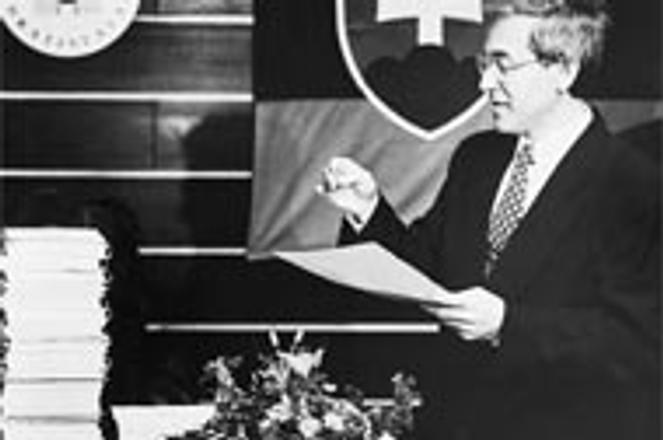EU Ambassador Georgios Zavvos (left) accepts voluminous reading from Foreign Minister Juraj Schenk.Ján Kuchta
It should have been a banner day for Slovakia. A beaming Juraj Schenk, Slovakia's foreign minister, stood at the Hotel Forum on July 19 flanked by European Union (EU) Ambassador to Slovakia Georgios Zavvos and other dignitaries. Lying on a table beside them was an EU questionnaire some 75 centimeters thick, a file of almost 3,000 pages that Slovakia was the first of the 12 associate countries to complete.
"I'm happy that we have managed to return the questionnaire before the official deadline," said Schenk. "Slovakia's attempt to integrate into the EU and other [Western] structures is no longer only a declaration." But Schenk's joy was dampened by statements on July 16 from one of the EU's most influential figures, German Chancellor Helmut Kohl.
While visiting his Austrian counterpart Franz Vranitzky, Kohl told the Austrian television station ORF: "I'm deeply sorry that Slovakia, in terms of its internal development...carries a political discussion which is deeply damaging to its name in Europe and in the world," the chancellor said. "Being a German, I am very much interested in Slovakia taking such a course that it would become an EU member, not some day, but as soon as possible. But at the moment, unfortunately, I must say that the preconditions [of Slovakia joining the EU] have not gotten better, they've gotten worse."
Not listening
Kohl's statement, at least publicly, seemed to fall on deaf ears. "Mr. Kohl is not an expert on Slovakia," Dušan Slobodník, chairman of Parliament's foreign affairs committee from the ruling Movement for a Democratic Slovakia (HZDS) said for the Slovak daily Sme. "We will use diplomatic channels to find out what made him say that."
"We do not want to make a race out of EU integration," said Katarína Tóthová, head of the government's legislative committee. "We are doing everything to fulfill all the conditions to enter the EU." "It is in the EU's interest to make Slovakia a member," said Jozef Sedovič, deputy chairman of the governing coalition's Slovak National Party (SNS).
Ján Čarnogurský of the opposition Christian Democratic Movement (KDH) understood Kohl's remarks differently, calling them the "most authoritative confirmation of the fact that Slovakia is leaving the pool of countries to be integrated into the EU in the first wave." "Until now, such statements were heard from lower-ranking EU officials," Čarnogurský added. "Kohl's opinion is the official opinion of EU leaders."
Greater opposition role
EU officials have been requesting that opposition parties be given a greater role in decision-making for quite some time. "A strong government in a strong democracy needs a strong opposition," said Werner Hoyer, plenipotentiary of the German government for EU matters, while visiting Slovakia in June. He said that while the EU does not want to preach, "political culture is not judged by what the majority decides, it is judged by how the opposition is taken into the process."
Since the governing coalition led by Prime Minister Vladimír Mečiar took power in November 1994, its appointees have been fully in charge of privatization, the state-owned broadcast media, and prosecution and supervision over the Slovak Intelligence Service.
Moreover, many of its legislative initiatives have been privately and publicly criticized by Western institutions. When Francoise Vallin, secretary general of the Party of European Socialists visited Slovakia in April, he said that according to European politicians, Mečiar "represents an obstacle for Slovakia's future EU membership." According to Mečiar, the responsibility for Slovakia's negative perception abroad lies with "every one of us - the government, the opposition, the parliament, the journalists."


